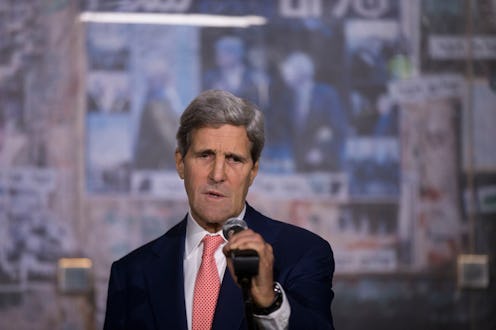News
Kerry: Iran Rejected Nuclear Deal
A weekend of super-secret talks between six foreign ministers in Geneva has not led to an Iran nuclear deal, Secretary of State John Kerry announced Monday. Although the United States and the other major powers had seemed, at one point, on the brink of an agreement with Tehran, the deal was reportedly rejected by the Iranians. However, Kerry was quick to emphasize that progress had been made regardless — which, after three decades of stalemate, is still something.
Six foreign ministers representing what's known as the P5+1 (the U.S., UK, France, China, Russia and Germany) met in Geneva over the weekend, prompting many to hope that talks on Iran's nuclear program had reached a promising stage. On Friday, Iran's moderate Foreign Minister Mohammad Javad Zarif even said a "framework" for a deal had been reached, and on Monday, Kerry said that all negotiating partners had ok-ed the the proposal when it was presented to the Iranians.
"The French signed off on it, we signed off on it," Kerry said.
According to Kerry, the deal was apparently blocked by Iran — although Zarif wrote in a Facebook post that "one of the delegations had some problems" with the deal, not specifying names.
"The possibility of reaching an agreement with the P5 +1 existed but it was necessary for everyone to be on the same path," Zarif wrote.
CNN reported that U.S. officials were hoping for a deal that would halt Iran's uranium enrichment at 20 percent, effectively nullifying the possibility of a nuclear weapon being constructed. Tehran, for its part, was looking for some relief from international sanctions put in place last year, which have crippled the country's economy. But a major issue has been Iran's demand that the West recognize its "right," as a signer of the U.N. accord that governs nuclear technology, to enrich uranium, often pointing out that Israel, by contrast, hasn't signed.
"We came to Geneva determined. As President Obama has said, his goal is, since day one as President, to make certain that Iran does not acquire a nuclear weapon. That remains our goal because we remain committed to preventing the proliferation of weapons of mass destruction and we remain committed to protecting our allies, particularly our allies in that region where security is so critical, " Kerry said in a statement.
"There’s no question in my mind that we are closer now, as we leave Geneva, than we were when we came," he added. The P5+1 is set to meet again in Switzerland next week on November 20 for another go at hammering out an deal over Iran's nuclear program. Meanwhile, however, on a positive note, a "roadmap" agreement was signed by the International Atomic Energy Agency (IAEA) and Iran on Monday — the deal would give inspectors access to Iran's nuclear sites, in particular its controversial Arak heavy water reactor, as well as its Gachin uranium mine.
